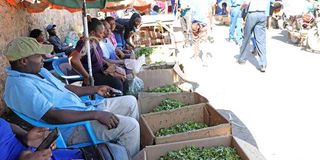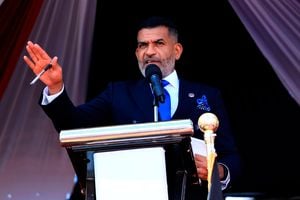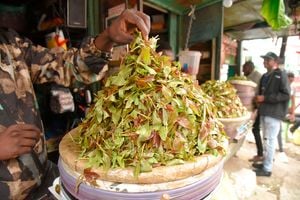
Mombasa County Youth Sports and Gender CEC Kenneth Ambani in his office at Uhuru na Kazi Building in Mombasa.
Last week, Mombasa Governor Abdulswamad Shariff Nassir banned the entry, transportation, sale and consumption of the popular stimulant muguka, arguing that its effects are harmful to youths in his county.
Governors of Kilifi and Taita Taveta counties followed suit and banned the stimulant, with the move triggering disaffection in the muguka-growing county of Embu.
Governor Nassir argued that over half the number of people in Mombasa rehabilitation centres were recovering muguka addicts.
But on Monday, President William Ruto weighed in on the matter, directing the Ministry of Agriculture and Livestock to convene a consultative forum “to address concerns raised and agree on the implementation of the Miraa/ Muguka Regulations 2023.”
In a statement issued from State House on Monday said the government would commit Sh500 million in the 2024/25 financial year to offer value addition to muguka and miraa crops.
And on Tuesday, the High Court sitting in Embu suspended the ban on muguka with Justice Lucy Njuguna issuing a restraining order against the ban until July 8 this year “pending an inter partes hearing.”
But even as the President sought middle ground and the court temporarily helped back the ban, a section of sports officials in Mombasa is already celebrating Governor Nassir’s directive saying it will help improve the standards of sport in the region by rescuing talented sportsmen and women from the effects of the stimulant.
Twaha Mbarak, the vice chairman of Football Kenya Federation (FKF) Premier League side Bandari Football Club, has been an outspoken advocate for the ban.
“The decision by Governor Nassir is a much-needed intervention. Muguka has been detrimental to our players' health and performance,” Mbarak stated emphatically on Tuesday.
Community health
“Our athletes need to be at their physical and mental best, and muguka has been a significant obstacle. This ban will help our players focus on their training and improve their overall performance on the field.”
Kenneth Ambani, the Mombasa County Sports Executive, echoed Mbarak’s sentiments, emphasising the broader implications of the stimulant on youth and community health.
In an exclusive interview with Nation.Africa, Ambani said the main aim of the ban is to safeguard the future of sports as a whole and the future of youths in Mombasa
“Governor Nassir's ban on muguka is a progressive step towards safeguarding our youth from the adverse effects of this substance," Ambani remarked.
“Our goal is to foster a healthy and active generation that can excel in sports and other fields. By removing Muguka from the equation, we are creating a more conducive environment for nurturing talent and promoting a healthy lifestyle.
“Let's not kid ourselves that this is good business; this is a business aimed at ending our future generations. As a county government, we should prioritize banning muguka. It is not only detrimental to our sports but also to our future," emphasized Ambani.
“We expect other counties to follow suit as we rid this plant from our children's lives,” Ambani, also a renowned thespian, added.
Research has shown that muguka has adverse effects on athletes and significantly impacts mental health.

Muguka traders display their wares at Kongowea Market in Mombasa City on May 12.
Muguka, known for its stimulating effects, has become alarmingly popular among young footballers in the coastal region despite its consumption having been linked to various health issues, including increased heart rate, hypertension, and severe mental health problems such as anxiety and depression.
These effects are not conducive to the rigorous demands of athletic training and performance.
FKF Mombasa official Lilian Nanundu also praised the ban, highlighting the long-term benefits for the footballing community.
“The ban on Muguka is a strategic move that aligns with our goals of enhancing the quality of football in the region," Nanundu stated.
Improved performance
“Athletes require optimal health and focus to perform at their best. Removing muguka from their lives will undoubtedly lead to improved performance, higher discipline levels, and better overall well-being."
The ban has garnered support not only from sports administrators but also from players and coaches themselves.
Harambee Stars forward and Bandari FC assistant captain Hassan Abdalla highlighted the detrimental impact of muguka on football.
“Muguka has become a household name in football; it's rampant in stadiums and has led to the downfall of many young players in Mombasa. They become lazy in training, develop poor attitudes, and neglect hygiene and rest," Abdalla said.
"This drug has been the downfall of many players who were even better than me. It slowly engulfs you, and after some time, you find yourself turning to other hard drugs, leading you down the path of addiction."
Samuel Wanjohi, who is a member of the KPA basketball team’s board of trustees and a FIBA Coaching Instructor, also praised the initiative.
“With a ban, the future is secure," Wanjohi stated, noting that the move will ensure players get adequate rest and maintain a positive mindset.
“As a basketball stakeholder, I fully support this measure. I am certain that it is a significant victory for the entire sports community," Wanjohi noted.
His words were echoed by KPA player Natalie Mwangale.
"This is a win for basketball and a win for sports as a whole," the sports men’s forward said.
By curbing muguka consumption, the region aims to reduce the rates of addiction and associated health problems, thereby fostering a more productive and health-conscious community.
Governor Nassir's decision is seen as a catalyst for change, with hopes that other counties will follow suit.
Muguka, just like miraa, contains cathine, a stimulant that is on the list of substances banned by the World Anti-Doping Agency (Wada).
According to Wada, cathine is prohibited “when its concentration in urine is greater than five micrograms per millilitre.”
At the 2004 Olympic Games in Athens, Kenya’s bantamweight boxer David Munyasia was ejected from the competition after testing positive for the banned cathine.
Munyasia’s subsequent appeal at the Court of Arbitration for Sport was also turned down.
Aged 24 at the time, Munyasia – who confessed to having chewed miraa - was among 200 competitors who underwent dope tests upon arrival in Athens.
Boxing, particularly in Mombasa and the coastal strip, has been significantly affected by the widespread use of miraa and muguka, Chrispine Onyango, a boxing coach and secretary general of the Mombasa Boxing Association, regrets.
“Miraa and its variants are banned from boxing. We already suffered from this tragedy back in 2004 (Munyasia case), and a lot of talent goes to waste because athletes don't realise they are using a banned substance.
“As the boxing community in Mombasa, we believe this is a good move, not only for boxing but for other combat sports as well."
The stimulant’s recent bans in Mombasa, Kwale and Kilifi counties have set a precedent, demonstrating a unified regional approach to tackling the muguka menace.
These measures are anticipated to significantly improve the quality of life for many residents, especially the youth, who are the future of the nation's sports and overall development.
The coast region is a key sports catchment area with Kenya Ports Authority basketball and football teams dominating national tournaments over the last three decades.
Coast schools have also been serial champions in basketball and netball at the national level and the ban is seen by many as a welcome move that will help steady this talent supply pipeline.









